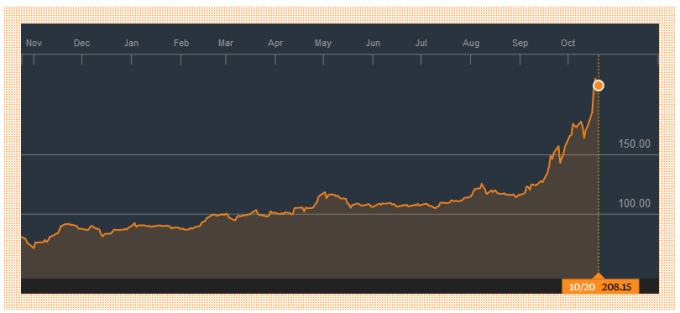How many people are playing PUBG now? 2 million? 2 billion? 2 trillion? Whatever the number, we know its insane. We also know that its player-growth was not slow and steady, but what seemed to be an accelerating exponential growth. It seems that pretty much everywhere I go, I keep seeing those same exponential graphs of growth. A few things are growing at an incredible rate. Its not especially relevant, but lets look at the robot company KUKA and its share price:

Holy fuck. Now one could argue (and I do), that this is people suddenly realizing the potential for future revenue and market share that a long established high quality robotics firm has in a super-accelerating market. But one could also argue that its just the herd mentality, or people buying KUKA because other people have bought KUKA. Be honest…if you have savings you are thinking about it now aren’t you? FWIW, I’ve doubled my investment :D
I remember a long time ago standing in a physical store (GAME) fondling a boxes copy of world-of-warcraft. I was not the target market for the game. I didn’t really play MMO games, I didn’t like fantasy games, I was not excited by the name, description or the videos I had seen. But there I was, holding the box thinking that maybe I should play it too.
Maybe I SHOULD play it TOO.
Bizarrely this is normal, and in some ways primitively rational. if everyone in your cave is only eating the red berries, you only eat the red berries. if everyone else flees from the tiger, you do too. Its a decent survival instinct when it comes to identifying both danger, and a decent source of food. Its absolutely fucking useless when it comes to entertainment.
I saw the comedian Stewart lee live last night, and he has a hilarious rant about people asking him if he has seen Game Of Thrones. I especially loved it, because I dont watch Game Of Thrones, but the SOCIAL PRESSURE to watch it is quite high. I even tried an episode of Westworld (FFS can they squeeze any more sexual violence or rape fantasies into a single episode?) because ‘everyone’ was watching it…
And I admit I am part of the problem. if you haven’t seen Silicon Valley, I will lecture you on how you should, because its awesome, everyone agrees etc…
So how does this relate to games and indie game development? Well basically there is a line, somewhere, and above that line, you go into a positive spiral of awesomeness. More people play your game, so more ‘friends’ see that their friends are playing, and they grab the game too, then steam notices that the time played and the ‘conversion’ is going up, so it gets displayed to more people, so more people get the game, so more streamers notice it and start wondering if they should stream it and…
And there is also another line. below this line, nobody is playing the game. The steam forums are empty because nobody has any questions. Nobody sees their friends playing, and the game is not in any charts. Nobody streams it, because nobody is playing it. Nobody is buying it so the dev earns no money for any PR. No journalist writes about it because frankly nobody is playing/streaming/tweeting about it…and down we go into the vortex of failure.
As a games producer/marketer/business person, your job is to aim for the high line, and live in fear of the low line. Be aware that 95% of indie games are below that second line. How can you fix this? There are basically two systems at play:
OPTION 1: MONEY
Basically this is ads, and its also stuff like appearing at every show, and getting in the faces of taste-making players, streamers, bloggers and so-on. Appearing at a show is EXPENSIVE and its basically advertising. You do this if you have money. If a show takes 4 days and costs you £4k, then you have to be a pretty successful dev to be worrying more about the time than the money in that case. (Even then you can reduce the burden by hiring someone to go to the show, or only sending 1 team member).
OPTION 2: TIME
Social media is your friend. Hang out on every game forum, every social media site, post about your game, the making of your game, the financing of your game, the support of your game, everything. Reply to every comment thread and every review. make every customer feel special, even the angry ones. Aim to turn every player into a fan, listen to every concern and promise to address it, keep the players informed as to what you are working on. All of this is free, but really time consuming. take this option if you have no money, but are young and enthusiastic, or have a team size > 1.
Also be aware both systems rely on you making the best game you possibly can. That goes without saying.
Me? I tend to choose option 1 because a) I am time-limited, b) I live in nowheresville and 3)I’m not very extroverted. The big question is probably ‘where is the line’. To be honest, I’m not sure, but I know its definitely above $1,000 a day in steam revenue. I have some evidence that $2,500 a day in revenue will be self-sustaining for a long time, but below $1,000? thats not momentum at all, thats just heading into a downwards spiral. YMMV.